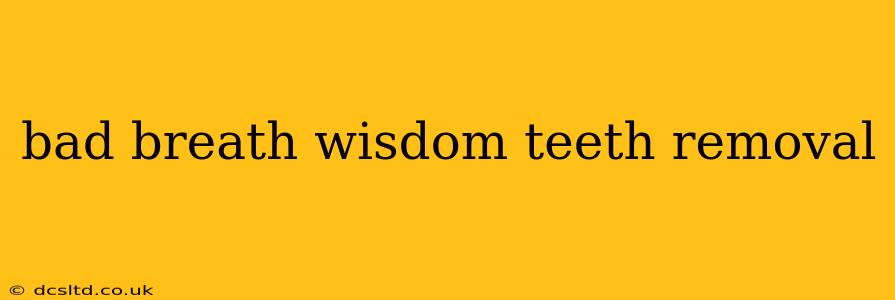Wisdom teeth removal is a common procedure, but it can sometimes lead to unpleasant side effects, including bad breath (halitosis). Understanding the causes of post-operative bad breath is crucial for effective prevention and treatment. This comprehensive guide explores the reasons behind this issue, offering practical advice to alleviate the problem and maintain good oral hygiene.
Why Do I Have Bad Breath After Wisdom Teeth Removal?
Several factors contribute to bad breath following wisdom teeth extraction. The most significant causes are:
-
Blood Clots: The initial formation of blood clots at the extraction sites is essential for healing. However, if these clots are dislodged or break down prematurely (a condition known as dry socket), they can expose the underlying bone and nerve endings, leading to a foul odor. Dry socket is a painful condition that usually needs professional attention.
-
Food Debris: The healing process often involves some degree of swelling and difficulty in cleaning the surgical area thoroughly. Food particles can easily become trapped in the sockets, creating a breeding ground for bacteria and resulting in unpleasant breath.
-
Infection: In some cases, infection can develop at the extraction sites. This infection, often accompanied by pain, swelling, and possibly fever, produces a noticeable bad breath.
-
Oral Hygiene Neglect: Reduced oral hygiene practices in the days following surgery, due to pain or discomfort, can exacerbate bacterial growth and lead to bad breath.
-
Medications: Certain medications, particularly those with drying effects, can contribute to bad breath by reducing saliva production. Saliva plays a crucial role in neutralizing odors and cleansing the mouth.
How Long Does Bad Breath Last After Wisdom Teeth Removal?
The duration of bad breath after wisdom teeth removal varies depending on several factors, including individual healing rates, the complexity of the surgery, and adherence to post-operative instructions. Generally, bad breath should subside within a few days to a week as the extraction sites heal. However, if the bad breath persists for longer, it’s crucial to consult a dentist or oral surgeon to rule out any complications, such as dry socket or infection.
How Can I Prevent Bad Breath After Wisdom Teeth Removal?
Proactive measures can significantly minimize the risk of post-operative bad breath:
-
Follow Post-Operative Instructions: Strictly adhere to your dentist or oral surgeon's instructions regarding post-operative care, including rinsing, diet, and medication.
-
Gentle Rinsing: Use a prescribed antiseptic mouthwash or saltwater rinse as instructed to keep the extraction sites clean and prevent infection. Avoid forceful rinsing, which could dislodge blood clots.
-
Maintain Oral Hygiene: Brush and floss gently around the extraction sites, avoiding direct contact with the surgical areas until they heal. Focus on keeping the rest of your mouth clean to prevent bacterial buildup.
-
Diet Considerations: Avoid strong-smelling foods and beverages, such as garlic, onions, and alcohol, which can exacerbate bad breath. Consume soft, easy-to-chew foods to minimize irritation of the healing tissues.
-
Hydration: Drink plenty of water to promote healing and help keep your mouth moist, aiding in saliva production and reducing bad breath.
What Should I Do if I Have Bad Breath After Wisdom Teeth Removal?
If you experience persistent bad breath after wisdom teeth removal, even after taking preventive measures, consult your dentist or oral surgeon immediately. They can assess the situation, rule out complications, and provide appropriate treatment. Prompt attention can prevent more serious problems and help ensure a smooth recovery.
Is Bad Breath After Wisdom Teeth Removal a Sign of Dry Socket?
While bad breath can be a symptom of dry socket, it's not the sole indicator. Dry socket is characterized by severe pain, a persistent foul odor, and sometimes a visible empty socket. If you suspect dry socket, seek immediate dental care.
Can I Use Mouthwash After Wisdom Teeth Removal?
Yes, but only as directed by your dentist or oral surgeon. Some mouthwashes may be too harsh and irritate the healing tissues. They will typically recommend a gentle salt-water rinse or a specific prescribed antiseptic mouthwash.
This information is for general knowledge and does not constitute medical advice. Always consult with a qualified dental professional for any concerns related to wisdom teeth removal or post-operative care.
